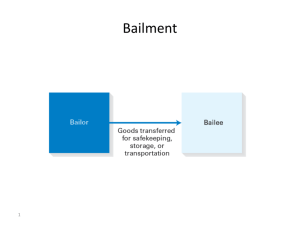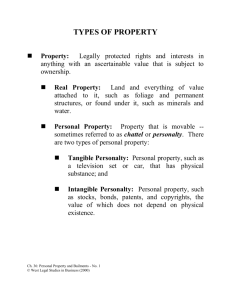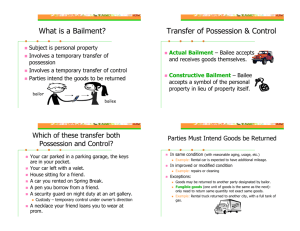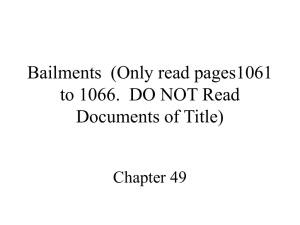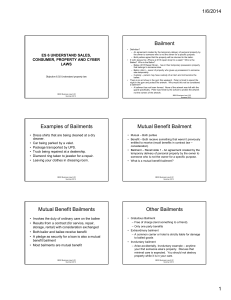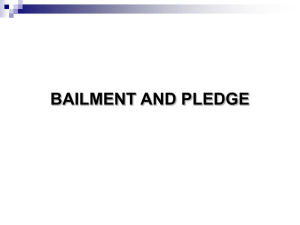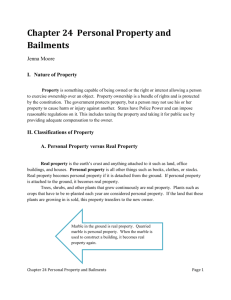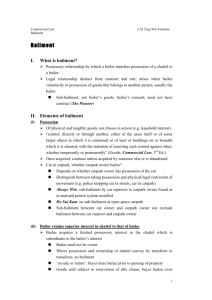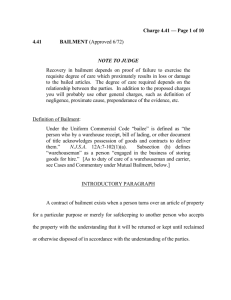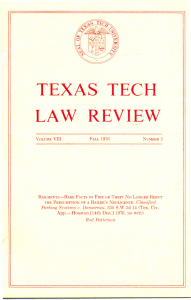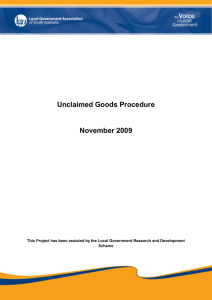Property Law & Bailments: Types, Ownership, and Bailments
advertisement
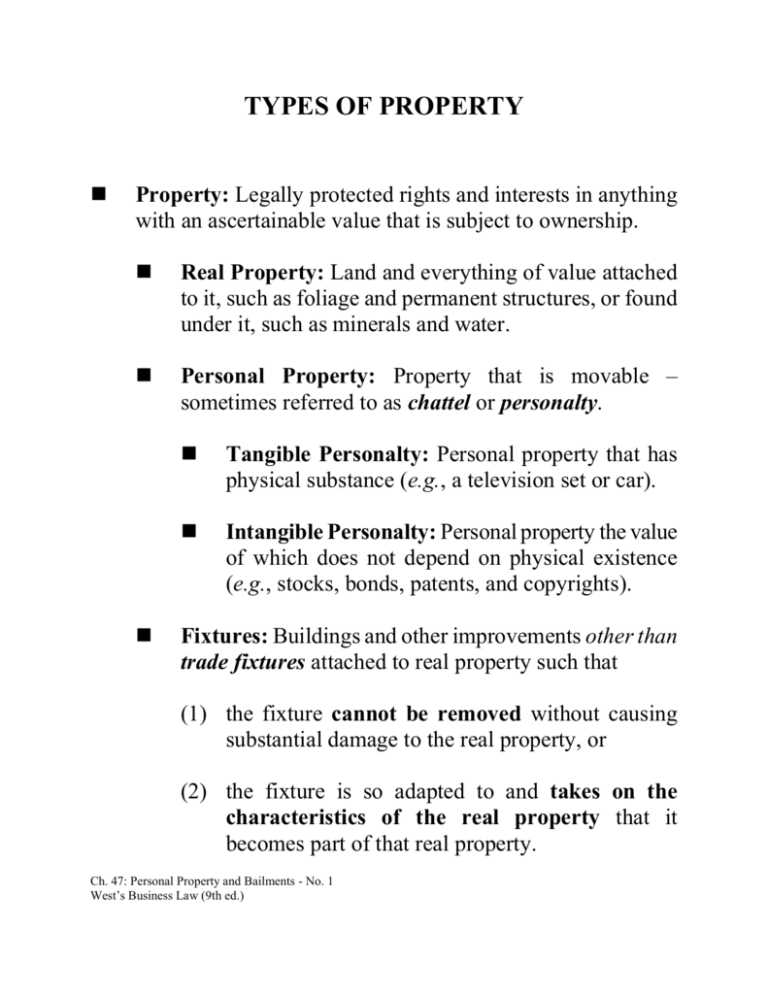
TYPES OF PROPERTY Property: Legally protected rights and interests in anything with an ascertainable value that is subject to ownership. Real Property: Land and everything of value attached to it, such as foliage and permanent structures, or found under it, such as minerals and water. Personal Property: Property that is movable – sometimes referred to as chattel or personalty. Tangible Personalty: Personal property that has physical substance (e.g., a television set or car). Intangible Personalty: Personal property the value of which does not depend on physical existence (e.g., stocks, bonds, patents, and copyrights). Fixtures: Buildings and other improvements other than trade fixtures attached to real property such that (1) the fixture cannot be removed without causing substantial damage to the real property, or (2) the fixture is so adapted to and takes on the characteristics of the real property that it becomes part of that real property. Ch. 47: Personal Property and Bailments - No. 1 West’s Business Law (9th ed.) PROPERTY OWNERSHIP Fee Simple: Absolute ownership entitling the property owner to possess, use, or dispose of the property as she chooses. Concurrent Ownership Tenancy in Common: Co-ownership of property in which each party owns an undivided interest in the whole property. Joint Tenancy: Joint ownership of property in which each co-owner owns an undivided interest in a portion of the whole property. Tenancy by the Entirety: Joint ownership of property by husband and wife, where neither party can transfer his or her interest in the property without the other’s consent. Community Property: Joint ownership of property by husband and wife in which each spouse owns an undivided one-half interest in property acquired during marriage. Ch. 47: Personal Property and Bailments - No. 2 West’s Business Law (9th ed.) ACQUIRING OWNERSHIP: NON-GIFTS Ownership of personal property may be obtained in the following ways: Purchase: Property rights may be acquired in exchange for money or other valuable consideration. Possession: Property rights may be acquired by taking possession of unclaimed, lost, or abandoned property. Production: Property rights may be acquired by creating the property. Accession: Property rights may be acquired by adding value to existing property by personal labor or materials. Ownership by accession may be subject to challenge if (1) the accession was wrongfully done, or (2) the accession greatly increased the value of the property or changed its identity. Confusion: Property rights may be acquired by mixing together goods belonging to two or more persons in such a way so that the separately-owned goods can no longer be identified. Ch. 47: Personal Property and Bailments - No. 3 West’s Business Law (9th ed.) ACQUIRING OWNERSHIP: GIFTS Gift: Any voluntary transfer of property made without consideration, past or present. In order for a transfer of property to be considered a gift, the following conditions must be satisfied: (1) Donative Intent: The donor (the person giving the gift) must intend for the transfer to be a gift; (2) Delivery: The gift must be delivered to the donee (the person for whom the gift is intended), who, as a result of the gift, must be free to exercise dominion (ownership rights) over the property in question; and (3) Acceptance: The donee must accept the gift. Inter Vivos Gift: A gift made during the donor’s lifetime and not in contemplation of imminent death. Causa Mortis Gift: A gift made in contemplation of the donor’s death. The donee must survive the donor in order to accept the gift. If the donor does not die as expected, the gift is revoked. Ch. 47: Personal Property and Bailments - No. 4 West’s Business Law (9th ed.) MISLAID, LOST, OR ABANDONED PROPERTY Mislaid Property: Property with which the owner has voluntarily parted and then cannot find or recover. When mislaid property is found, the finder does not obtain title to the mislaid property, but rather holds it in trust for the true owner. Lost Property: Property with which the owner has involuntarily parted and then cannot find or recover. When lost property is found, the finder can claim title to the property superior to that of any other person except the true owner. Estray Statute: A statute defining a finder’s rights in property when its true ownership is unknown. Abandoned Property: Property with which the owner has voluntarily parted with no intention of recovering it. When abandoned property is found, the finder can claim title to the property superior to that of any other person including the true owner. Ch. 47: Personal Property and Bailments - No. 5 West’s Business Law (9th ed.) BAILMENTS Bailment: A situation in which the personal property of one person (the bailor) is entrusted to another person (the bailee), who is obligated to return the bailed property to the bailor or dispose of it as directed by the bailor. Bailments involve only personal property – real property cannot be the subject of a bailment. Possession of the bailed property must be transferred to the bailee in such a way that: (1) the bailee is given exclusive possession and control over the property (subject to the bailor’s superior rights), and (2) the bailee knowingly accepts the personal property delivered by the bailor. A bailment agreement may be either express (i.e., written) or implied (i.e., not written) and presumes that the bailed property will be returned to the bailor or a third party designated by the bailor or will be disposed of by the bailee in the manner agreed to by the bailee and the bailor. Ch. 47: Personal Property and Bailments - No. 6 West’s Business Law (9th ed.) ORDINARY BAILMENTS There are three types of ordinary bailments: (1) Bailment for the Sole Benefit of the Bailor: A gratuitous bailment made for the convenience and benefit of the bailor; (2) Bailment for the Sole Benefit of the Bailee: A gratuitous bailment made for the convenience and benefit of the bailee; and (3) Bailment for the Mutual Benefit of the Bailor and Bailee: This most common kind of bailment involves some compensation by the bailor for services rendered by the bailee. Ch. 47: Personal Property and Bailments - No. 7 West’s Business Law (9th ed.) BAILEES: RIGHTS AND DUTIES Rights of Bailees: Certain rights are implicit in any bailment agreement (absent explicit terms to the contrary), namely (1) the right to control and possess the bailed property during the term of the bailment agreement, (2) in some cases, the right to use the bailed property, (3) except in cases of gratuitous bailments, the right to be compensated, and (4) the right to limit their liability for damage to the bailed property by agreement with the bailor, as long as the limitation (a) is called to the bailor’s attention and (b) is not contrary to public policy. Duties of the Bailee: A bailee must (1) take proper care of the bailed property, and (2) surrender the bailed property to the bailor or dispose of it in accordance with the bailor’s instructions. A bailee who fails to return or dispose of the bailment as instructed by the bailor is presumed to be negligent. Ch. 47: Personal Property and Bailments - No. 8 West’s Business Law (9th ed.) BAILORS: RIGHTS AND DUTIES Rights of Bailors: A bailor has the right to expect that (1) its property will be protected with reasonable care while in the bailee’s possession, (2) the bailee will use the property as agreed, (3) the bailee will relinquish the property as directed by the bailor, (4) the bailee will not convert the goods unless agreed, (5) the bailee’s liability will not be limited except as known to the bailor and as permitted by law, and (6) repairs or service to the property will be done in a workmanlike manner. Duties of Bailors: A bailor must (1) compensate the bailee as agreed, and (2) notify the bailee of all defects known to or reasonably discoverable by the bailor. Ch. 47: Personal Property and Bailments - No. 9 West’s Business Law (9th ed.) TERMINATION OF BAILMENTS Bailments for a specific term end when the stated term lapses. Otherwise, a bailment can be terminated at any time by: (1) mutual agreement of the bailor and bailee; (2) demand by the bailor or bailee; (3) satisfaction of the purpose of the bailment; (4) an act by the bailee that is inconsistent with the terms of the bailment; or (5) operation of law. Ch. 47: Personal Property and Bailments - No. 10 West’s Business Law (9th ed.) DOCUMENTS OF TITLE Document of Title: A document which purports (i) to be issued by or addressed to a bailee and (ii) to cover goods in the bailee’s possession which are either identified or fungible portions of an identified mass. Bill of Lading: A document, issued by a person engaged in the business of transporting goods, verifying the receipt of goods for shipment. Warehouse Receipt: A receipt issued by a person engaged in the business of storing goods for hire. Delivery Order: A written order to deliver goods directed to a warehouser, carrier, or other person who, in the ordinary course of business, issues warehouse receipts or bills of lading. Ch. 47: Personal Property and Bailments - No. 11 West’s Business Law (9th ed.) SPECIAL TYPES OF BAILMENTS Common Carrier: An owner and provider of publiclyavailable transportation services who renders those services in return for compensation. Warehouser: A provider of storage for compensation. The delivery of goods to a common carrier creates a bailment relationship between the bailor whose property is being shipped and the common-carrier bailee, who is held strictly liable for the bailed personal property. Unlike the strictly-liable common carrier, a warehouser is liable for loss or damage to bailed property resulting from the warehouser’s negligence. However, the warehouser is expected to exercise a higher degree of care, commensurate with the warehouser’s status as a professional bailee, than an ordinary bailee. Innkeepers: Innkeepers, hotel owners, and others who provide lodging to the public for compensation as a regular business are strictly liable for any loss of or damage to their guests’ property. Ch. 47: Personal Property and Bailments - No. 12 West’s Business Law (9th ed.)
